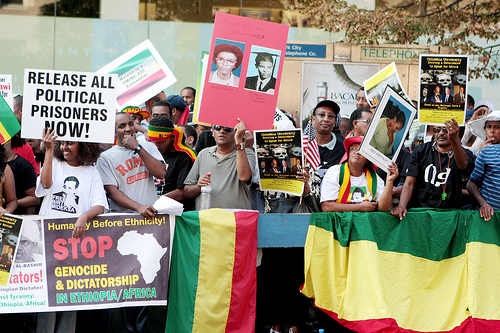Letter to Kaliti Prison
by Mesfin Negash / October 19, 2012 / 3 Comments
A criticism of one of Ethiopia’s most infamous prisons

A 2010 protest calling for the release of political prisoners in Ethiopia. Photo: Mira. Creative Commons.
Dear Kaliti prison,
I hope that addressing you as a legal person is not a crime in this age of ‘criminalization of life’ in our country. You should understand my fear; after all, you know how political prisoners end up in your cells for silly or seemingly fictitious crimes. Take journalist Re’eyot Alemu who is sentenced to live in and with you for exchanging emails and sending photos of graffiti in Addis. Mind you, she didn’t paint the graffiti that reads “Beqa” (“enough”). Do you think someone in the democratic world would end up in jail for taking a picture of graffiti purportedly drawn by Bin Laden? You must have heard that journalists interviewed Bin Laden and other “criminals” praised for their courage and endeavour. I know Re’eyot’s story won’t move you because you must have witnessed more ridiculous and horrific stories. By the way, how is she doing? Last time I checked, she was begging to see a doctor and have more books.

- Why does a country with her own unique alphabet and long history of writing persist to deny citizens the right to freedom of expression in this era of Expression? No other country in Africa may typify this paradox more than Ethiopia. As Leopold Senghor’s famous collection of poems entitled “Ethiopiques” remained ‘powerful and popula’ so does the source of his intriguing title, Ethiopia, in her own ways. In “Ethiopiques,” I share Ethiopian views on pertinent issues related to journalism, culture and, of course, the overarching subject of politics.

- Mesfin Negash is an Ethiopian journalist living in exile in Sweden. He is one of the journalists accused of “terrorism” in 2011 by the Ethiopian government. The co-founder and first editor-in-chief of an acclaimed Ethiopian newspaper, Addis Neger, he is currently the Managing Editor of Addisnegeronline.com. He is a political science student by training and known for his critical commentaries on significant political and social issues.
When you came to prominence many thought that you would be a better prison than your elder ‘brother’ Kerchele. I didn’t know either of you enough to have an opinion, but no political prisoner speaks well of you. How does it feel to be king of all prisons in Ethiopia? The two Swedish journalists characterized you, during a recent discussion, as a “detention centre of prisoners of war” rather than a standard prison. This is very disrespectful of them. I heard that there are 123 officially recognized prisons throughout the country. Do you know how many unofficial and secret ‘siblings’ you have in the country? Well, if federal prisons in America have many secret ‘siblings’, why shouldn’t you? Prisoners transferred from these secret prisons may tell stories in your compound. Unfortunately, these stories will overshadow any improvements you may have made.
Allow me to ask you one very personal question. What is the difference between a visit by the International Red Cross and any local institution? I always wonder why you are so shy towards international visitors and researchers. Given your stature, you are expected to show the world that your treatment of prisoners, especially the political ones, is up to international norms and principles.
Do you keep a strict log of your inmates? What is your maximum capacity? Do you remember the last time you were jam-packed with prisoners? I can guess. A close friend of mine told me about your horrific solitary confinement rooms. Your official and unofficial personnel abuse prisoners in these dark rooms. There are reports that unregistered prisoners disappear in your belly. Others are killed by prison guards.
How many political prisoners are humiliated, bitten, harassed and provoked in your cells? How many of them have lost their hope in Ethiopia? How many of them curse the day they entered into politics because of your treatment?
I might tolerate your total lack of basic facilities. Poor prison of a poor country, one can say. You could have improved, had it not been for your officials. Nevertheless, how can I accept the physical and psychological pain inflicted intentionally on nameless and numberless prisoners? No one but you knows who these prisoners of conscience are, how they survive your long days, how tormenting life becomes under your sky for them. We know very few of them by name. How many suffer in your secret ‘sister-prisons’ all over the country? Their cries are neither reported nor told. Tell me, tell me their names. Tell me, tell me their stories. Tell me, tell me.
I know many courageous and wise prisoners turn their prison days into a productive season. Some change their life for good as much as some are lost forever. There are many who deserve to be punished according to the law. You may be kind even to these criminals so that they can rebuild their lives anew. But let all your prisoners of conscience free. Kaliti, free yourself; redeem your soul. Inevitably the day will come for you to grow into a decent, standard prison, and Ethiopia into a country where citizens won’t be thrown into jail for having a different opinion.
P.S. I couldn’t find your email or mailing address. Therefore, I will send you this letter through ICRC.





3 Comments on "Letter to Kaliti Prison"
you are very strong Ethiopian men journalist.
Hello!
I look forward to be able to access free books, articles, journals, magazines, and dissertations related to freedom of expression and political impacts to media.
With regards,
Zelalem Jabessa
Addis Ababa, Ethiopia
Mesfine you are such brilliant journalist. I really miss your views. I always admire your neutrality and the way you express it. By the way the other bloggers use two language for their blogs, so why not you have the Amharic version of your blog. Abiyebekele@ethionet.et